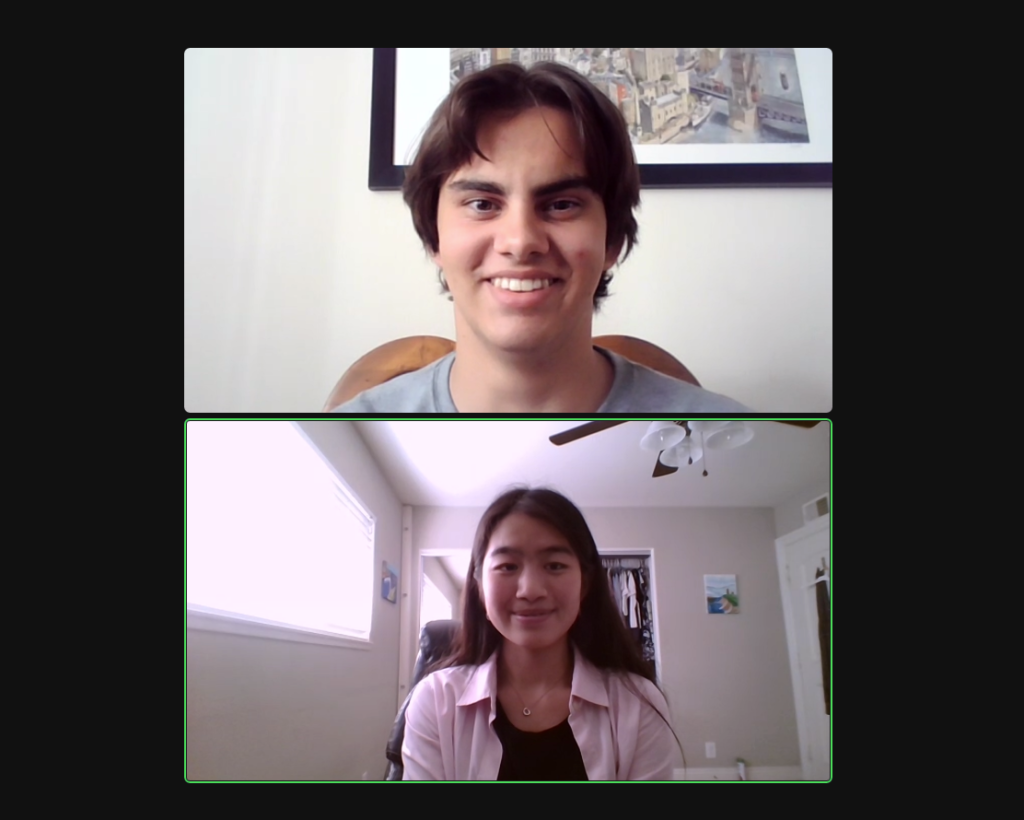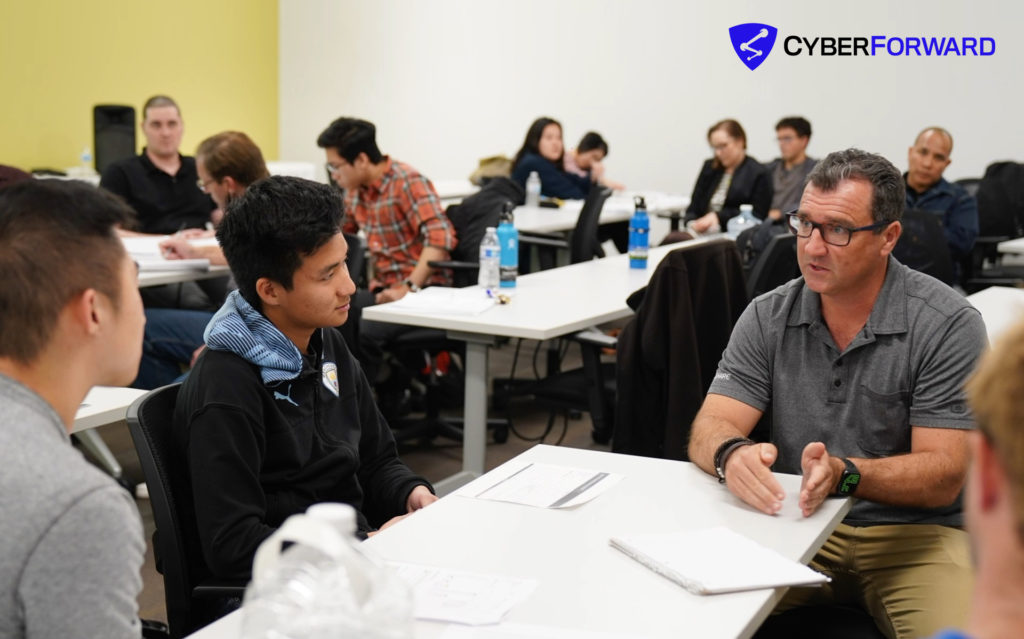A year ago, senior Michael Collins hadn’t really given much thought to the world of cybersecurity. Now, it’s a potential career.
“Cybersecurity is really outside-of-the-box thinking,” said Collins, who attends Trabuco Hills High School in the Saddleback Valley Unified School District. “It forces you to think like an attacker, to try to find holes in your own solution in order to improve it and constantly make it better.”
Collins, 17, is one of about 20 high schoolers who took part in an online academy hosted last summer by CyberForward, a professional development firm that trains candidates for high-demand cybersecurity careers. As part of a collaboration with the OCDE-led OC Pathways initiative, the academy started in late June of 2021 and ran for seven weeks.

But it didn’t end there for Collins. Underscoring the red-hot demand for skilled cybersecurity personnel, as well as Orange County’s own focus on career readiness, CyberForward offered paid internships to six high school participants right after they completed the program — including Collins.
“I had heard a few things about cybersecurity from the news, but it’s something you never really think much about,” he said. “You just think, oh, I have to go change my password now. But this experience removed layers to show what’s really happening in the background. There are people who work day in and day out to stop these attacks.”
Haley Bae, a senior at Ocean View High School in the Huntington Beach Union High School District, also made the jump from an academy participant to a paid intern who works two-hour shifts from her computer on Tuesdays and Thursdays. She said she originally learned of the opportunity from her math teacher, who also teaches computer science at Ocean View.
“Being in this program really has taught me a lot,” said Bae, 17. “It opened my eyes and expanded my horizons to see that there’s so much more to this industry than just firewalls.”
Bridging skills gaps
As online attacks against businesses and public agencies grow in number and sophistication, the need to train and hire cybersecurity professionals has become that much more acute.
Enter CyberForward. The company, which partners with local employers and nonprofits, started out as the training arm of the cybersecurity firm CISOSHARE before spinning off as its own firm in October 2021. Yet its overall mission has remained consistent: Since 2019, CyberForward has worked to strengthen the cybersecurity workforce by bridging skills gaps among unemployed adults and those seeking a career change.
Along with offering training, CyberForward maintains a pool of hiring partners to connect participants with potential employers. And last summer it decided to expand operations to include high school juniors and seniors.
Teaming up with Coastline ROP and the CEO Leadership Alliance of Orange County, CyberForward built a first-of-its-kind program that launched with students from the Newport-Mesa, Irvine and Saddleback unified school districts, as well as the Huntington Beach Union High School District. Similar to its adult courses, the student academy used a multiphase model that coupled foundational training in cybersecurity with work-based learning and employer engagement.
About 20 teens participated in the inaugural seven-week session, receiving high school credit and real-world work experience at the same time. As the program neared completion, CyberForward planned to offer two of its graduates paid internship positions. But when six qualified candidates submitted applications and interviewed for the open positions, CyberForward founder and CEO Mike Gentile decided to onboard all six.
“They just blew us away with how quickly they jumped in and how quickly they understood the material,” said CyberForward Academy Director Lynn Stewart.
The high school interns began their assignments by job-shadowing project leaders, assisting with presentations and participating in meetings, most of which have been virtual. Over time, however, they are gradually taking on more complex assignments, such as reviewing policies and working with project managers to assess the security architecture of clients and partners.
“Now that we have that baseline level of knowledge from the summer program, they’ve allowed us to sort of take it a notch up, and we’re going to do more advanced work,” said Collins. “While we’re still learning new things constantly, we’re able to use that baseline and now apply it.”
“I would say it’s more intense,” added Bae, “and it’s way more high-level than what we did before.”
‘Zero unemployment’
Stewart concedes that the world of cybersecurity can seem daunting to newcomers, with arcane job descriptions and an alphabet soup of acronyms. But, she said, not all of the jobs are highly technical. In fact, there are approximately 60 different occupations in cybersecurity, and many positions don’t require advanced degrees, including roles on the business, policy and customer service sides.
As CyberForward works to build virtual fortresses against cyberattacks, it’s also seeking to remove barriers for prospective job candidates by demonstrating that cybersecurity careers can be as accessible as they are rewarding.

“We’re trying to demystify cybersecurity, to show that there’s so much opportunity and it’s not necessarily all technical,” Stewart said. “We’re teaching skills that will help students in college if they want to move on to college, or if they want to move right into the workforce.”
“There isn’t just one path,” she added. “I would encourage students to apply and get some experience and exposure in this field.”
On the heels of its first summer session, CyberForward worked with OC Pathways to launch a fall after-school program for students in the Santa Ana and Orange unified school districts, as well as OCDE’s Alternative Education division. That was followed up with another cohort in the spring, and CyberFoward is already planning its second summer session. Ideally, they’d like to reach every district in Orange County.
Each of these sessions is another opportunity to give high school students real-world experience while showing them what working in cybersecurity is really like, Stewart said. At the same time, the program is fortifying a workforce that is increasingly in demand.
“It really is one of those fields where there’s zero unemployment,” Stewart said, “and we need more people.”
Bae said she would “definitely consider” pursuing a career in cybersecurity, perhaps as a policy analyst or on the data analytics side. She also wouldn’t rule out becoming a programmer.
“What I found interesting about cybersecurity is that there isn’t just one solution,” she said. “You can’t just install something and then it automatically protects you from everything. But you can have that peace of mind knowing that you have all these things to protect you. It keeps you on your toes.”
